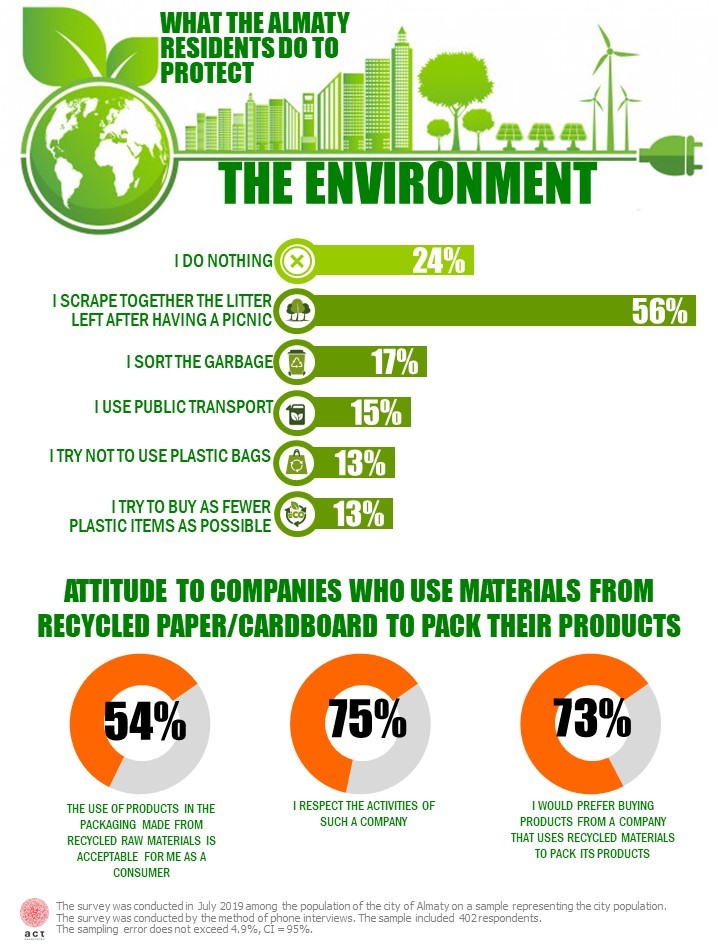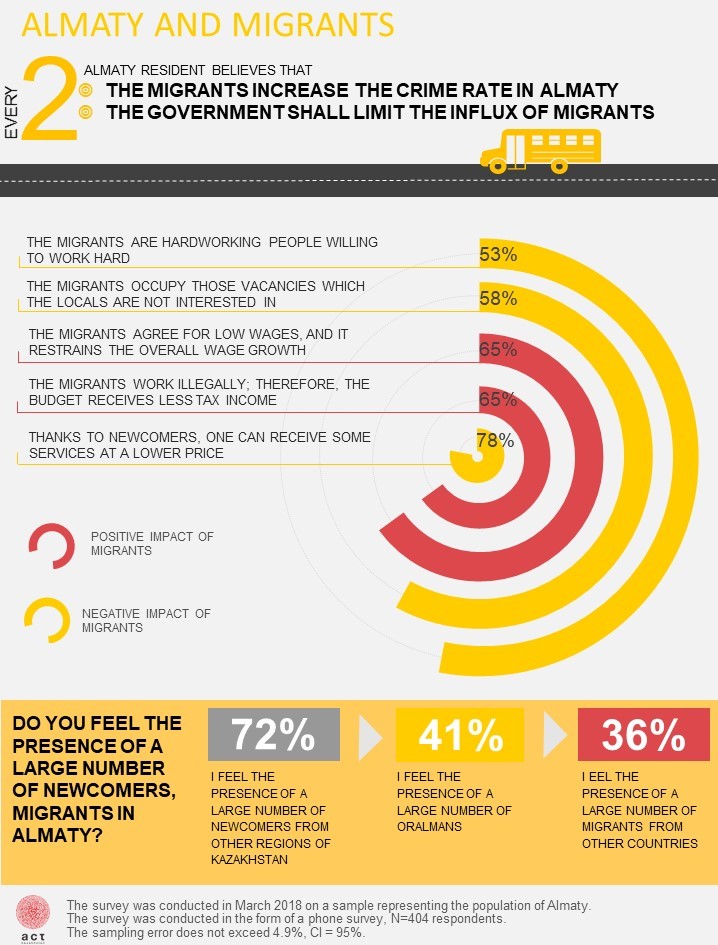




Vitamins (lat. Vita – life) are low-molecular organic compounds that make an active part of many enzymes or are starting substances for the synthesis of hormones. What is behind the complex definition of vitamins? The importance of certain types of food for preventing certain diseases has been known since antiquity. The first works that studied the role of nutrition in maintaining health appeared back in the XIV century. Vitamins were discovered by scientists in the early XX century. At different times, different amounts of substances were considered vitamins; as of mid-2018, there are 13 known vitamins.
The XX century was not only the century of the discovery of vitamins, but also the time of research, experiments, and arguments for and against taking vitamins. By now, the researchers and doctors have reached an agreement while the public still shares many myths about vitamins. ACT Kazakhstan has questioned the Almaty residents about some popular myths about vitamin and the habits of vitamin consumption. We are publishing the results of our survey during the period of spring vitamin deficiency.
17% of the respondents have never taken vitamins. All other respondents have taken vitamins in the periods of immunity weakening – during viral diseases, after illnesses, at signs of vitamin deficiency. 30% of the respondents take vitamins only by medical prescription. About a third of the respondents (28%) buy and take vitamins both by medical prescription and by their own decision. At that, 40% of Almaty residents make their own decisions about taking vitamins.
The next question on the way the decision to choose/buy vitamins and vitamin complexes is made revealed that about 45% of Almaty residents buy the vitamins and vitamin complexes prescribed by a doctor. Apart from that, when choosing vitamins, Almaty residents rely on the information available on the Internet (42%), listen to the recommendations of their familiarity (25%), or consult pharmacists in a drug store (18%).
Our survey returned the following answers to the statements provided below:
The survey was conducted in September 2019 among the population of the Almaty on a sample representing the city population. The age- and gender-related quotas corresponded to the data of the Statistical Committee MNE RK. The survey was conducted by phone interviews. The sample included 415 respondents. The sampling error does not exceed 4.8%, CI = 95%. The use of the materials is permitted with the obligatory mention of the author of the survey.

The world community is more and more concerned about environmental issues. They gather conferences, sign international agreements. Even schoolchildren do not stay away from this worldwide problem: they boycott classes, calling for attention to what is happening around. But to everyone’s regret, detailed information and data on the real scale of what is happening are limited. This information deprivation is characteristic of our country as well. In July 2019, ACT Kazakhstan conducted an environment survey among Almaty residents. The survey studied the involvement of residents in the problems and solutions to the environmental situation in the city.
42.3% of the respondents considered the environmental situation in Almaty as unfavorable. The others assessed it as follows:
According to the survey, the responding Almaty residents treat air pollution from automobile exhaust (79.4%) as the most pressing environmental problem.
According to the city residents surveyed, TOP5 environmental problems include:
It is worth noting a difference in male and female views on the problem. Both men and women consider air pollution from automobile exhaust to be the main problem. However, men put in second place the air pollution from industrial exhaust (16.1%) while women mentioned the household waste (19.1%). Being asked about the activities they take part in to protect the environment, 24% of the respondents said they were taking no action. Most of the respondents (55.5%) said they always scrape together the litter left after having a picnic. TOP2 answer was, “I take no action since I don’t know what to do” (18.3%).
TOP5 activities in which Almaty residents take part in to protect the environment:
The survey showed that women were more conscious about sorting and disposing of garbage. 7.5% of women in Almaty try to buy as fewer plastic items as possible vs. 5.7% of men; 4.3% of women by eco-products vs. 2.5% of men. However, men were more active in planting trees – 6.8% vs. 4.5% of women. During the survey, we asked the Almaty residents about their attitude to the use by some companies of recycled paper/cardboard for packaging.
In particular, we studied the attitude of the target audience to the statements:
The survey was conducted in July 2019 among the population of the city of Almaty on a sample representing the city population. The age and gender quotas corresponded to the data of the Statistical Committee MNE RK. The survey was conducted by the method of phone interviews. The sample included 402 respondents. The sampling error does not exceed 4.9%, CI = 95%. The use of survey materials is permitted with the obligatory mention of the author of the survey.

In this survey, ACT Kazakhstan has identified the perception and attitude towards migrants in Almaty. The survey showed that more than half of the respondents (53%) did not feel the presence of a large number of migrants from other countries. At the same time, every third Almaty resident (36%) said to the contrary. Taking into account the socio-demographic profile, mostly women aged 46 to 57 years felt the presence of a large number of migrants from other countries. According to the survey, the majority of respondents (72%) felt the presence of a large number of newcomers from other regions of Kazakhstan. Such perception was most common among men aged 46 to 57 years old. Regarding oralmans, the opinions divided equally: 41% of the respondents felt the presence of a large number of repatriated ethnic Kazakhs, while 40% did not feel the presence of a large number of newcomers of this category.
During the survey, the locals most often agreed with such positive statements regarding migrants as:

By gender and age groups, men aged 18 to 27 years mostly shared the positive statements. At the same time, some negative statements towards migrants were registered:
By gender and age groups, men prevailed in negative statements as well, but in this case, they were aged 46 to 65 years. Every second respondent believed that the Government should limit the influx of migrants. The survey was conducted in March 2018 among the population of the city of Almaty on a sample representing the city population. The survey was conducted in the form of a personal interview. The sample size was 404 respondents. The sampling error does not exceed 4.9%, CI = 95%. The use of survey materials is permitted with the obligatory mention of the author of the survey.
Companion animals have become an integral part of human life, and we do not think about their usefulness. ACT Kazakhstan tried to identify if many people kept dogs, cats, and other companion animals and what their benefit is for their holders. The survey showed that more than half of the respondents (56%) kept companion animals. Out of those, who kept companion animals, 64% preferred cats, 63% – dogs, 10% – birds. About 5% of the respondents kept exotic animals: turtles, lizards, snakes, snails, spiders, hedgehogs, guinea pigs.
The way the current holders obtained their pets:
– Bought – 47%
– Received as a present – 28%
– Picked up in the street – 25%
– Took from their friends/relatives/familiars – 10%
– Took from an animal shelter – 4%
Every fifth resident of Almaty who did not have a companion animal expressed a desire to have one within one year. During the survey, we asked about the influence of companion animals on people and the living conditions of companion animals.
We received the following answers to the proposed statements:
– 84% of the respondents believed that companion animals improved the emotional state of their holders
– 82% of the respondents believed that the presence of a companion animal at home helped fostering children (developing such features as kindness, responsibility, mercy)
– 71% of the respondents believed that companion animals had a positive impact on the health of their holders
– 68% noted that living in a flat did not allow them to hold companion animals since a private house would be a better place for them
– every second respondent (49%) considered it expensive to hold a pet
– 2/3 of the respondents agreed that there were many homeless animals on the streets of Almaty (43% – very many, 32% – rather many).
Most of the respondents (58%) did not care for homeless animals (34% responded they had a neutral attitude and did not participate in taking care for homeless animals, 24% were only feeling empathy). Among the Almaty residents who took care of homeless animals: 43% gave them food, 2% made charitable contributions for the rescue, treatment, and socialization of homeless animals, 2% helped to spread information (e.g., in social media) about taking care of homeless animals, 1% were volunteers taking care of homeless animals. The survey covered the issue of the need to control the population of homeless animals in the city – 1% of the respondents thought that their population needed no control.
The respondents who voted for control over the population of homeless animals proposed the following measures:
– To place them in shelters/nurseries – 49%
– To castrate them – 26%
– To catch them and release outside the city – 5%
– To euthanize them – 5%
— To conduct educational work among people – 2%
The survey was conducted in March 2018 among the population of the city of Almaty on a sample representing the city population. The survey was conducted in the form of a personal interview. The sample size was 404 respondents. The sampling error does not exceed 4.9%, CI = 95%. The use of survey materials is permitted with the obligatory mention of the author of the survey.